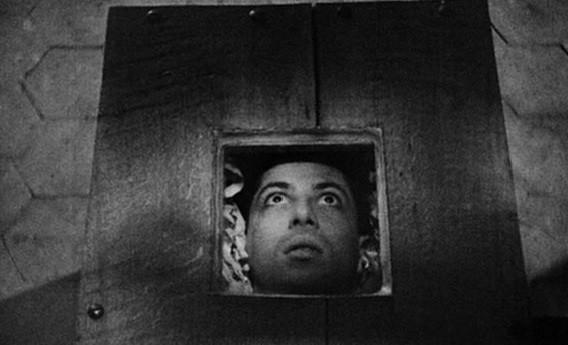The Cabin in the Woods is a wet-dream to smug, intellectual
students of horror movies. Wes Craven is still making Scream movies, but Cabin
is the real heir to what the first Scream movie did, which is turn a critical
eye and a smart mouth on horror movies while still trying to offer one. An
essay on how horror films are often so banal and uncreative wouldn’t be half as
entertaining as the Joss Whedon-penned epic we have here. But if a
critique—even an entertaining one—is all there was to Cabin, I wouldn’t be
writing about it. I think there’s more to Cabin.
Cabin begins with the clichés of a group of college students—a
jock, a serious guy, a jokester, a bimbo, and a serious girl—heading out to a
cabin with the intention of drinkin’ beer and havin’ sex. They’re carefully
prepped by technicians to fulfill these roles, we discover, and the cabin is
just as carefully rigged to watch their progress into the various possible
nightmares they can unleash from the cellar. The really smart move that makes
Cabin so much fun is that we’re often treated to the point of view of the
amoral, manipulative technicians, who playfully enjoy their jobs like video
game programmers.
The conceit of this narrative is that it’s explaining, as if horror films are records of real, historical events, why the characters in so many horror films are stereotypes who
make really foolish decisions, release unspeakable evil, and all die (except, as is so often the case, one girl). The technicians did it, you see! They injected stupidity serum into
the hairdye, sprayed pheromones, implanted tiny microphones--they did it! That’s pretty clever and
funny, I think, because it’s kinda true. Screenwriters, like technicians, do
reduce real, flesh-and-blood beings into bland stereotypes of ‘jock’ or ‘nerd’
and force them to make incredibly stupid decisions to move the plot along.
Cabin gets even better. The conceit is not just to explain
why the characters are so stupid and the plots cliché, but to playfully offer a
justification for it. The characters are being so manipulated because they have
to be sacrificed to a primordial, destructive deity beneath the technicians’
office. The method of sacrifice must be punishment for transgression--destruction deities are very particular. And the
transgressors have to occupy particular archetypes, like ‘athlete,’ ‘virgin,’
‘fool.’
What I enjoyed about this is how it mocks not just horror
screenwriting, but much of the academic criticism on horror filmmaking. Robin Wood’s influential Freudian reading of horror, in which the horror film brings the Id's repressed urges before the Ego in order for it to re-repress them, is dramatized, for instance. The primordial deity is the Id and its various,
repressed urges to consume and destroy. The deity, like us, needs to see
horrors like the undead raised and repressed; and (to Jung it up) archetypes
like alpha males crushed. Cabin goes on through theorists like Bruce Kawin, who
uses Fraizer’s anthropological theories to explicitly treat the horror film as a
kind of ritual sacrifice. The setup in Cabin is a literal ritual sacrifice to
the primordial deity. Similarly, Kawin’s argument that horror movies are an
externalization of nightmare is also met by Cabin’s suggestion that its
monsters are literally the stuff of nightmares. Most overtly, Cabin tackles Carol Clover’s theories about the ‘Final Girl,’ which stipulates that the
pleasure-seekers must be punished for their transgressions and the virginal,
androgynous girl purified through abject terror. This obviously informs the
entire setup in Cabin.
Again, if this is all Cabin had to offer, I probably wouldn’t be
writing about it. This is fun and playful, but kind of smug and appeals to an
inner smugness in me that I don’t like. Where Cabin earns my admiration is in
making its own argument, which it does with the character of Marty. Marty, the
‘Fool’ archetype and constant pot-smoker, is the only one of the numbskulls to
notice that they’re being manipulated. I don’t think Cabin’s point is that we
must all smoke weed. I think the point is that we all want to be free. Weed was
smoked in the Sixties and onward as a means of seeing beyond convention. LSD as a means of
seeing even further beyond. What’s wrong with much of horror screenwriting is
that the full freedom of humanity is abandoned to laziness—not ideology, but
laziness. What’s wrong with much of academic criticism on horror is that it
writes humanity into the corner of watching horror movies just to satisfy that
primordial deity in the depths, or to see women punished for their freedom.


0 comments:
Post a Comment